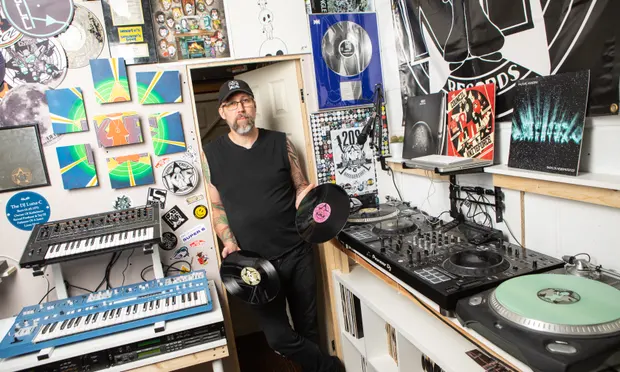Demand for records is soaring, and Britain’s supply problems are making it even harder to get albums pressed
Producer and DJ Chris Howell, also known as Luna-C, in his studio. Photograph: Antonio Olmos/The ObserverJames TapperSun 3 Oct 2021 03.00 EDT
Vinyl has been the music industry’s sleeper hit of the last few years. But for record label owners such as Chris Howell, there is a B-side.
Mashene Music Group – Info | Corporate Royalty Sharing | Social @ LinkTree
The founder of Kniteforce Revolution records is unlikely to have any 12-inch records to sell for the next six months. “I’ve gone from eight to nine releases a month to none,” said Howell, better known as Luna-C, whose first success came with the 1992 hit Sesame’s Treet as part of the Smart-E’s.
“I have about 60 different vinyl releases that have been cut and are at various stages [of production]. And I have been told by the record press that I’m unlikely to get any more this year.”
The reason is that vinyl is popular again – too popular for smaller labels like Howell’s. A flood of fresh releases, such as Abba’s new album Voyage, are being matched by reissues later this month from the Beatles and the Rolling Stones, not to mention an 18-LP box set of David Bowie.
Yet there are just a few pressing plants of meaningful size globally, so there is little capacity for smaller labels who might need only several hundred to a few thousand records pressed for a single release.
The huge jump in demand – global sales of vinyl are up by more than 700% in the past decade, says the IFPI (International Federation of the Phonographic Industry) – is coupled with typical Covid- and Brexit-related shortages such as a lack of lorry drivers and hikes in customs costs.
But there is also a lack of PVC after a storm in February halted Texan petrochemical plants, and a fire in 2020 at a lacquer plant in California left only one factory in Japan making the master discs that records are cut from.
A delay for a new Taylor Swift LP is an inconvenience but for labels such as Kniteforce, it is catastrophic. “Because of the vinyl resurgence, the big artists I work with can afford to take time off in their life to make the music because it’s actually worth it,” Howell said.

Vinyl Eddie in York on Record Store Day last year. Photograph: Richard Saker/The Observer
“With digital, there’s so little money in it that it’s just not worth doing.” Although Universal Music floated a fortnight ago on a valuation of £38bn based on expectations that streaming will continue to revive the music industry, the money from digital production is not trickling down to artists.
A typical artist needs about 300 streams to make $1 on Spotify (at $0.003 per stream), so those outside the mainstream rely on other income.
“I don’t work with a single artist that’s money motivated,” Howell said. “But if you’ve got children and a job and a mortgage, you can’t justify spending three weeks working on a new album if you’re gonna make £50 – whereas the vinyl market will make them £5,000. I’ve been building bit by bit, and I’ve been able to give them an advance.
“I probably spent 30 grand on advances, which I expected to be back by now, and none of that’s coming back till 2022. It’s not crippling yet but I have to make choices about new artists.”
Pete Cannon, a hip-hop, house and drum’n’bass artist, had turned to making music for TV commercials for Apple and other brands, but started up N4 Records in 2019.
“It was a passion project,” he said. “I was making 100 to 200 records and then it started getting a bit of traction. I was making videos on Facebook, breaking down how I make songs on old equipment from the 80s and 90s, and it caught a bit of wind. Suddenly, I was starting to sell 500 copies.
“Now, well, I just sold out of my first release this year, 8bit Trip. I ordered it in January, and the records arrived in the second week of September.”
Jay Cunning, a DJ on Kool London radio, receives releases from labels across the sector. “I’m hearing of delays of anything from six to nine months, so it’s a huge frustration for independent labels,” he said. “Some labels are refusing to even announce new tracks until they have received the finished product,” he added.
“In some ways, it’s reminiscent of 90s dubplate culture, when jungle and drum’n’bass emerged. It was very common to hear the Micky Finns and the Grooveriders play a record in a club, and you knew you weren’t going to get that on vinyl for at least 12 months.”
Dubplates are test presses: white label records that are normally used for quality control to make sure the record is reproducing the track properly. Turnaround times for tests are much quicker.
“One idea I’m considering is getting 50 or 100 dubplates pressed,” Cannon said. Record shops such as Disc World in south London offer one-off vinyl record pressing, although at a substantially higher cost.
Cannon is also capitalising on the vintage hardware and computers such as the Amiga and Atari that he uses to make music.
“People like records as a tangible piece of art,” he said, “especially in the underground scene. The last one I did comes with a floppy disk with samples that you can load on to an Amiga.”
Howell is looking at other options, including 10-inch records and potentially investing in his own vinyl production plant. “You have to be a bit innovative and work around these issues and not sit there and say, ‘Wah, it’s not want I wanted.’ You have to adapt. But it’s a bit annoying.”
Source: London Guardian







